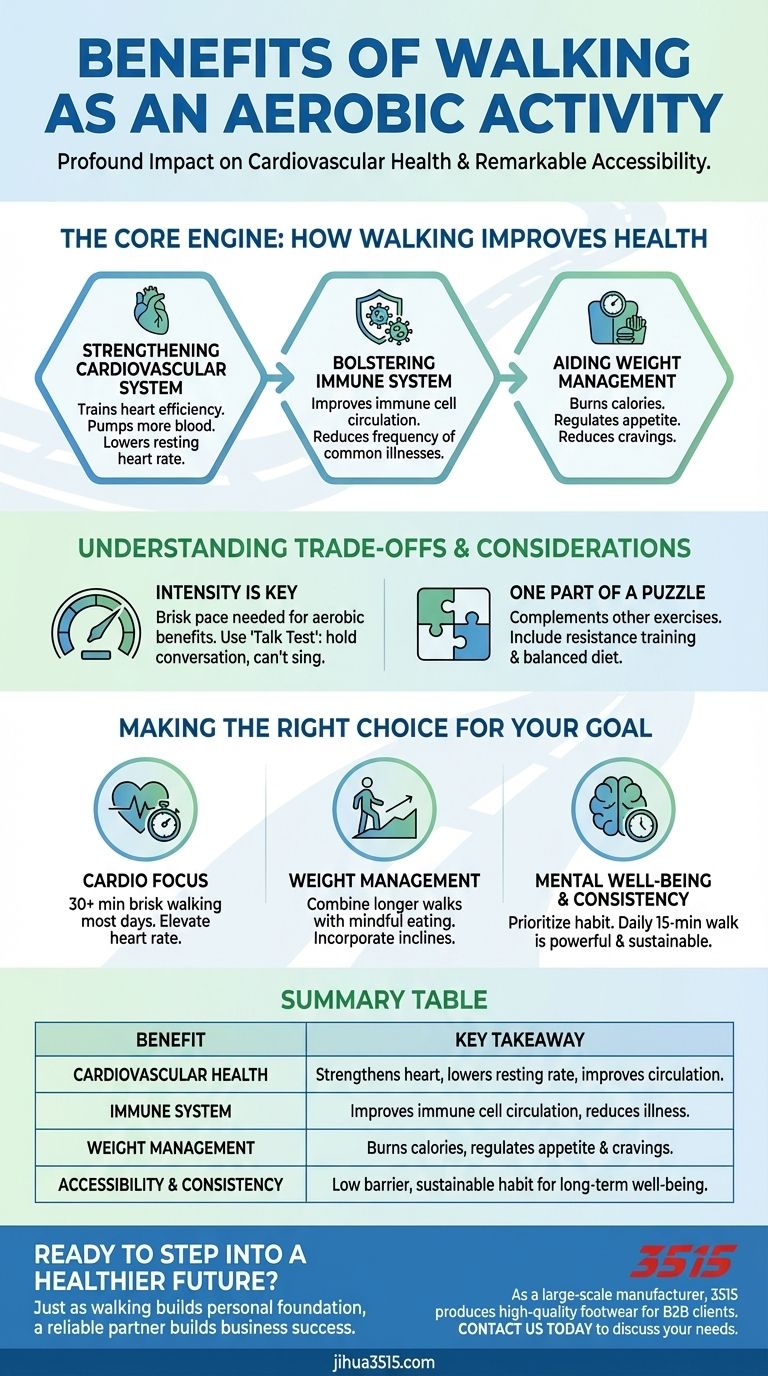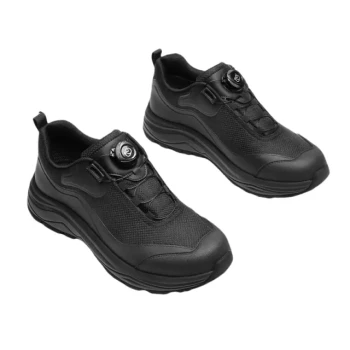The primary benefits of walking as an aerobic activity are its profound impact on cardiovascular health and its remarkable accessibility. It effectively gets the heart pumping and limbs moving, serving as a powerful tool to strengthen your circulatory system, reduce food cravings, and even help prevent sick days by boosting your immune function.
While often viewed as a simple, everyday activity, walking is one of the most effective and sustainable forms of aerobic exercise. Its true value lies in its ability to deliver significant health benefits with a very low barrier to entry, making it a foundational practice for long-term well-being.

The Core Engine: How Walking Improves Health
Walking is a weight-bearing, aerobic exercise. "Aerobic" simply means your body uses oxygen to efficiently produce the energy needed for the activity. This process is the foundation for its most significant benefits.
Strengthening the Cardiovascular System
Consistent walking trains your heart to become more efficient. Like any muscle, the heart adapts to the demands placed on it.
A regular walking routine forces your heart to pump more blood to your muscles. Over time, this strengthens the heart muscle itself, allowing it to pump more blood with each beat. This improved efficiency can lead to a lower resting heart rate and better overall cardiovascular function.
Bolstering the Immune System
The reference to "preventing sick days" is linked to exercise's effect on your immune response.
Moderate aerobic exercise, such as brisk walking, can improve the circulation of immune cells in your body. This makes them more effective at locating and managing pathogens, potentially reducing the frequency of common illnesses.
Aiding in Weight Management
Walking contributes to weight management through two primary mechanisms: calorie expenditure and appetite regulation.
First, it directly burns calories, which is essential for creating the energy deficit needed for weight loss. Second, some studies suggest that moderate exercise like walking can help regulate appetite and reduce cravings, making it easier to maintain a healthy diet.
Understanding the Trade-offs and Considerations
While walking is exceptionally beneficial, its effectiveness is directly related to a few key factors. Understanding these allows you to tailor your routine to your specific goals.
Intensity Is the Key Variable
A leisurely, casual stroll does not provide the same cardiovascular benefits as a brisk, intentional power walk.
To achieve significant aerobic improvements, you must walk at a pace that elevates your heart rate and breathing. A good rule of thumb is the "talk test": you should be able to hold a conversation, but not sing a song.
It's One Part of a Larger Puzzle
Walking is a fantastic foundation for fitness, but it is not a complete solution on its own.
For optimal health, walking should be complemented with other forms of exercise, such as resistance training for muscle and bone strength, and a balanced, nutritious diet.
Making the Right Choice for Your Goal
You can adapt your walking routine to target specific outcomes. A clear understanding of your primary goal is the most important factor.
- If your primary focus is cardiovascular health: Aim for at least 30 minutes of brisk walking that elevates your heart rate on most days of the week.
- If your primary focus is weight management: Combine consistent, longer walks with mindful eating, and consider incorporating hills or inclines to increase the intensity and calorie burn.
- If your primary focus is mental well-being and consistency: Prioritize the habit itself. A daily 15-minute walk is more powerful than an intense, sporadic workout you can't maintain.
Ultimately, the most effective exercise is the one you do consistently, and the accessibility of walking makes it a powerful choice for lifelong health.
Summary Table:
| Benefit | Key Takeaway |
|---|---|
| Cardiovascular Health | Strengthens the heart muscle, lowers resting heart rate, and improves circulation. |
| Immune System | Improves the circulation of immune cells, helping to reduce the frequency of common illnesses. |
| Weight Management | Burns calories and can help regulate appetite and reduce cravings. |
| Accessibility & Consistency | Low barrier to entry makes it an easy, sustainable habit for long-term well-being. |
Ready to step into a healthier future?
Just as a consistent walking routine builds a foundation for personal well-being, a reliable manufacturing partner builds the foundation for your business success. As a large-scale manufacturer, 3515 produces a comprehensive range of high-quality footwear for distributors, brand owners, and bulk clients. Our extensive production capabilities ensure you get the durable, comfortable shoes and boots your customers need.
Let's walk this path together. Contact our team today to discuss your footwear needs and discover how we can support your growth.
Visual Guide

Related Products
- Wholesale Durable & Breathable Training Shoes for Custom Brands
- Safety Footwear Wholesale Manufacturer for Custom OEM/ODM Production
- Durable Rubber Sole Outdoor Shoes Wholesale & Custom Manufacturing
- Premium KPU Athletic Safety Shoes for Wholesale
- Durable Rubber-Soled Utility Shoes for Wholesale & Custom Brand Manufacturing
People Also Ask
- What has been the global recognition of fabric for over 30 years? Industry's Trusted Benchmark for Durability
- What are racing motorcycle boots and their purpose? Maximize Rider Safety on the Track
- What role do high-frequency 3D force plates play in dynamic postural stability testing? Precision Balance Analysis
- What is the historical origin of boots? From Ancient Protection to Modern Safety
- What is the National Firefighter Registry for Cancer? A Critical Health Study for Firefighters
- What additional benefits do motorcycle boots offer besides protection? Boost Your Control and Comfort
- What are the manufacturing advantages of using Polyurethane (PU)? Explore High-Performance Footwear Solutions
- Why are elastic materials such as Lycra or Spandex selected for elderly footwear? Achieve Pain-Free Adaptive Comfort



















